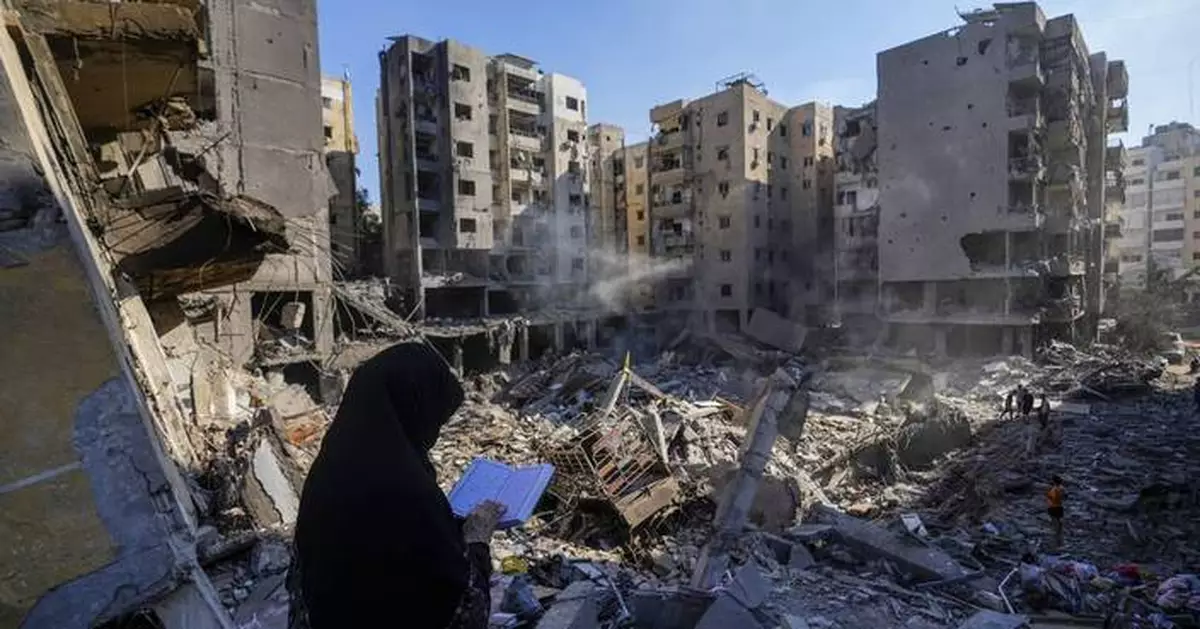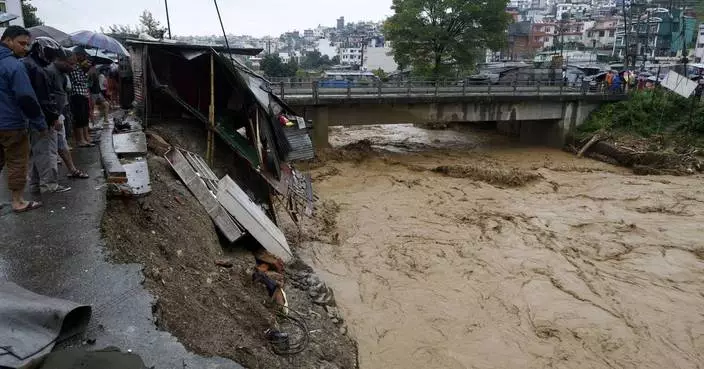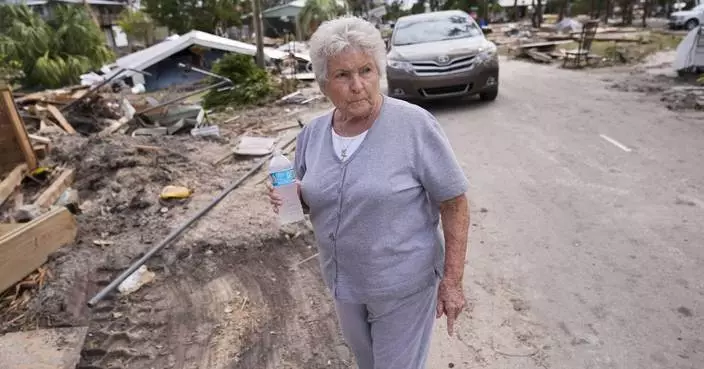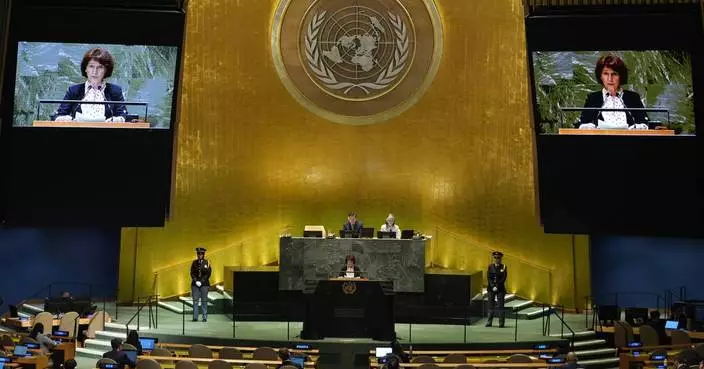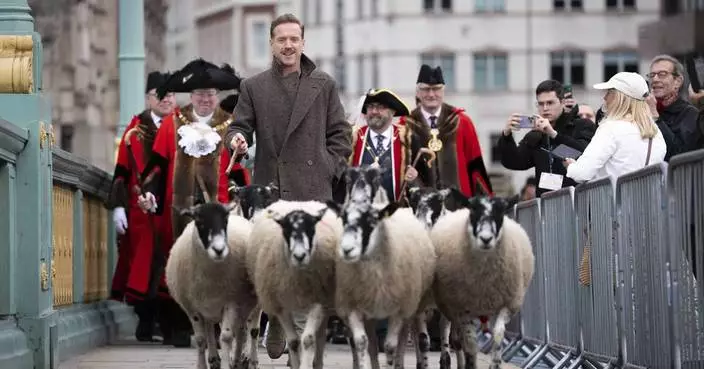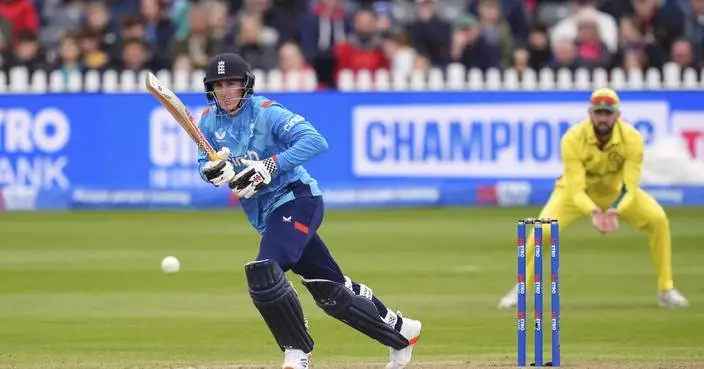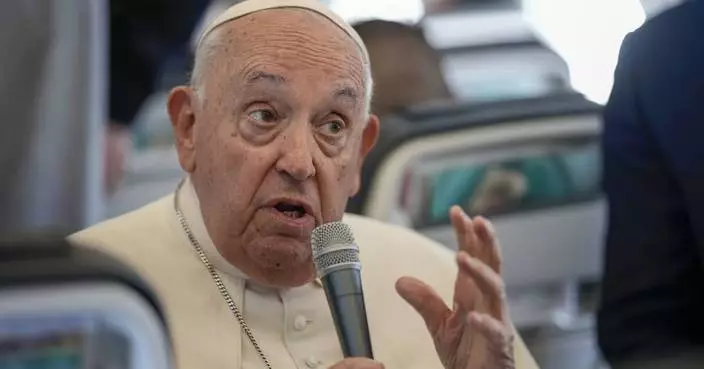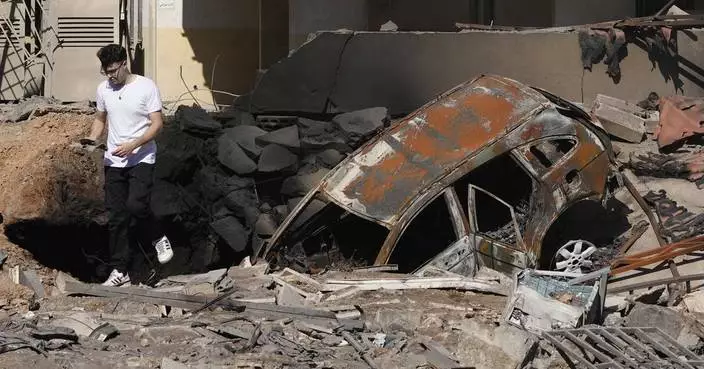BEIRUT (AP) — More than two days after a massive Israeli airstrike that killed the leader of the Hezbollah militant group, smoke is still rising from the smoldering wreckage.
Israel said the Friday night strike targeted a meeting at an underground Hezbollah compound. The blasts leveled multiple high-rise apartment towers in the densely populated predominantly Shiite southern Beirut suburb known as Dahiyeh.
Click to Gallery
BEIRUT (AP) — More than two days after a massive Israeli airstrike that killed the leader of the Hezbollah militant group, smoke is still rising from the smoldering wreckage.
A man stands on the rubble of buildings near the site of the assassination of Hezbollah leader Hassan Nasrallah in Beirut's southern suburbs, Sunday, Sept. 29, 2024. (AP Photo/Hassan Ammar)
A man mourns at the site of the assassination of Hezbollah leader Hassan Nasrallah in Beirut's southern suburbs, Sunday, Sept. 29, 2024. (AP Photo/Hassan Ammar)
People check the site of the assassination of Hezbollah leader Hassan Nasrallah in Beirut's southern suburbs, Sunday, Sept. 29, 2024. (AP Photo/Hassan Ammar)
Crumbled buildings at the site of the assassination of Hezbollah leader Hassan Nasrallah in Beirut's southern suburbs, Sunday, Sept. 29, 2024. (AP Photo/Hassan Ammar)
A man walks on rubble at the site of an Israeli airstrike in Beirut's southern suburbs, Sunday, Sept. 29, 2024. (AP Photo/Hassan Ammar)
Damaged buildings at the site of the assassination of Hezbollah leader Hassan Nasrallah in Beirut's southern suburbs, Sunday, Sept. 29, 2024. (AP Photo/Hassan Ammar)
A Hezbollah flag at the site of the assassination of Hezbollah leader Hassan Nasrallah in Beirut's southern suburbs, Sunday, Sept. 29, 2024. (AP Photo/Hassan Ammar)
A hole in the ground near the site of the assassination of Hezbollah leader Hassan Nasrallah in Beirut's southern suburbs, Sunday, Sept. 29, 2024. (AP Photo/Hassan Ammar)
A woman reads the Quran at the site of the assassination of Hezbollah leader Hassan Nasrallah in Beirut's southern suburbs, Sunday, Sept. 29, 2024. (AP Photo/Hassan Ammar)
Hezbollah confirmed in a statement Saturday that its longtime leader, Hassan Nasrallah, was killed in the strike — a huge blow for the group he had led for 32 years.
On Sunday, Associated Press journalists saw smoke still rising over the rubble as people flocked to the site, some to check on what’s left of their homes, others to pay respects and pray. Some were there to simply inspect the destruction.
Residents of Beirut heard up to 10 explosions following the Friday strike that targeted an area greater than a city block, reducing several residential buildings to a jumble of pancaked concrete and twisted steel. The buildings sank into the ground, leaving a cleared-out area bigger than a soccer field.
Israel on Saturday released videos it said were of the warplanes that took part in the strike, showing at least eight F-15Is, but it didn't provide any comment on the type or number of bombs used. Experts said the blasts and destruction left behind were consistent with the 2,000-pound (900-kilogram) -class bombs, likely designed to explode after penetrating structures.
The video showed the eight warplanes fitted with munitions consistent with American-manufactured BLU-109 penetrator bombs of the 2,000-pound class bomb; and a JDAM harness and tail kit, which is a precision guidance system.
The components, which together make up the GBU-31, have recently been transferred to Israel by the U.S., crisis and weapons researcher Richard Weir, from Human Rights Watch and currently in Beirut, told the AP. The bombs are known as “bunker busters.”
The Israeli military said the warplanes took off from Hatzerim, an airbase in southern Israel. The military also released radio communications of the commanding officer of the Israeli Air Force and the commander of 69th squadron after they carried out the strike.
Onlookers at the site Sunday clambered over large slabs of concrete, surrounded by high piles of twisted metal and wreckage. Several craters, likely used by rescuers to penetrate under the site of the explosion were visible, some of them apparently up to 30 meters (100 feet) deep.
A few Hezbollah workers were using a bulldozer to excavate around one of the craters, some of them apparently dug by rescuers to reach the dead. State security and investigators were nowhere to be seen.
The AP footage provided one of the closest looks at the site of the assassination and the extent of the destruction it caused.
So far, six deaths have been confirmed at the site, along with dozens of injuries, but it is not clear if the diggers are still looking for bodies. Some people on the scene Sunday said their relatives were still missing.
A woman wearing the black head-to-toe robe known as the chador stood on one side, reading from the Islamic holy book, the Quran, as a group of bystanders sobbed. One man collapsed in tears after seeing the immense destruction.
“Ya Sayyed, Ya Sayyed!” he cried, his head resting against a wall, as he referred to Nasrallah by his honorific title.
“Our morale is high and the struggle shall continue,” said Ali Rahhal, 30. “From here, from the heart of Dahiyeh, we say ‘labbayka ya, Nasrallah’,” he said. The Arabic phrase, which means "at your service, Nasrallah,” was often chanted by supporters at Hezbollah rallies.
Associated Press writer Fadi Tawil contributed reporting. Sarah El Deeb in Beirut contributed to this report.
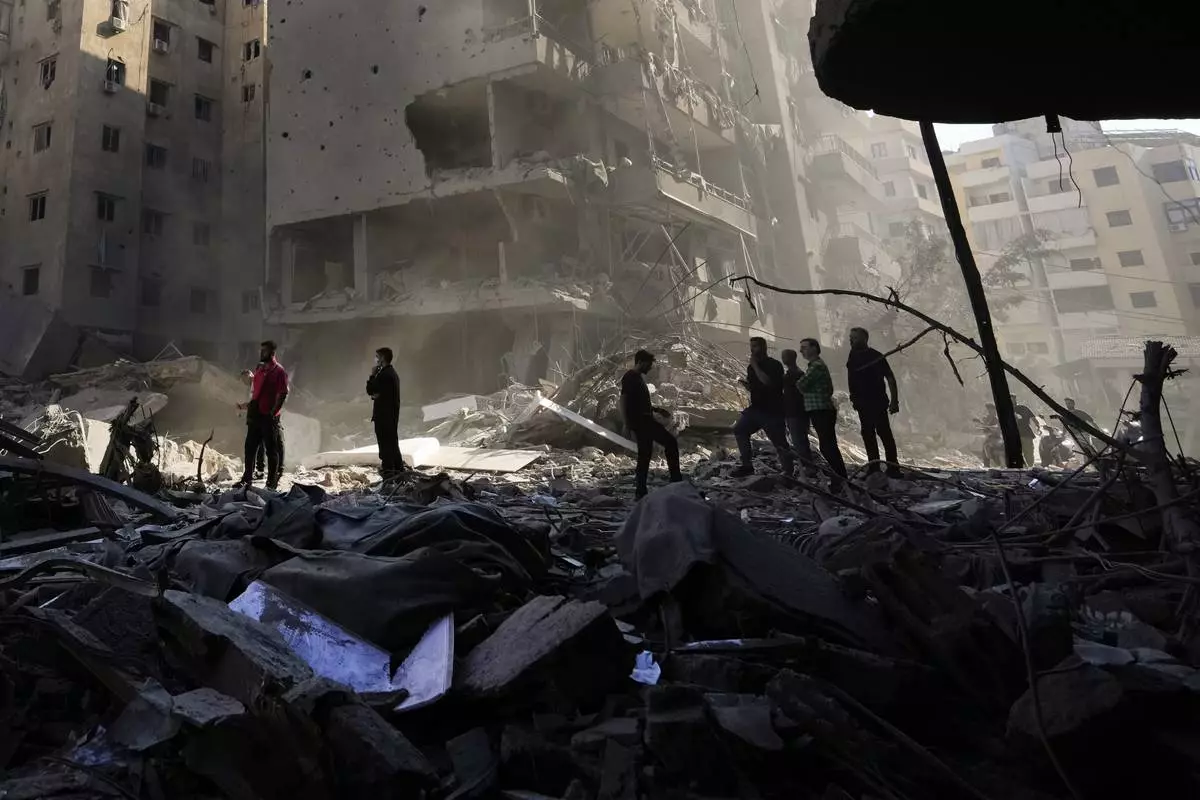
People check the site of the assassination of Hezbollah leader Hassan Nasrallah in Beirut's southern suburbs, Sunday, Sept. 29, 2024. (AP Photo/Hassan Ammar)
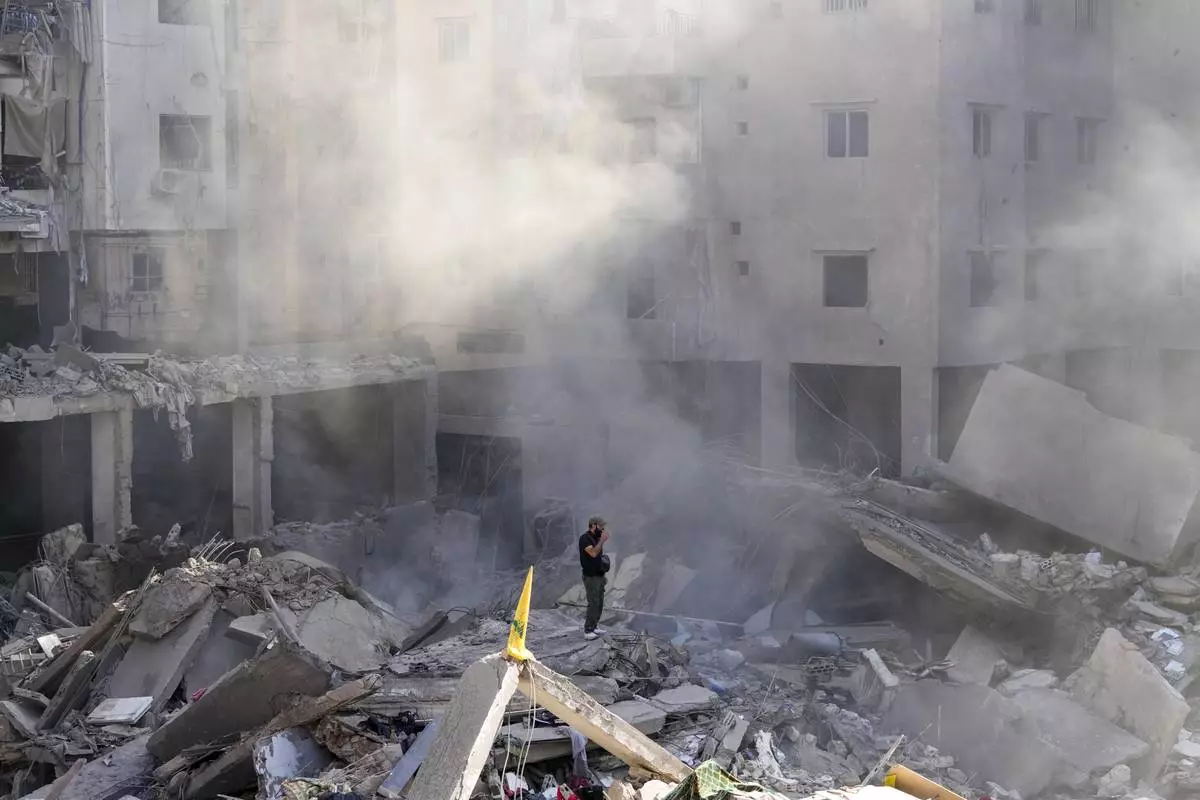
A man stands on the rubble of buildings near the site of the assassination of Hezbollah leader Hassan Nasrallah in Beirut's southern suburbs, Sunday, Sept. 29, 2024. (AP Photo/Hassan Ammar)
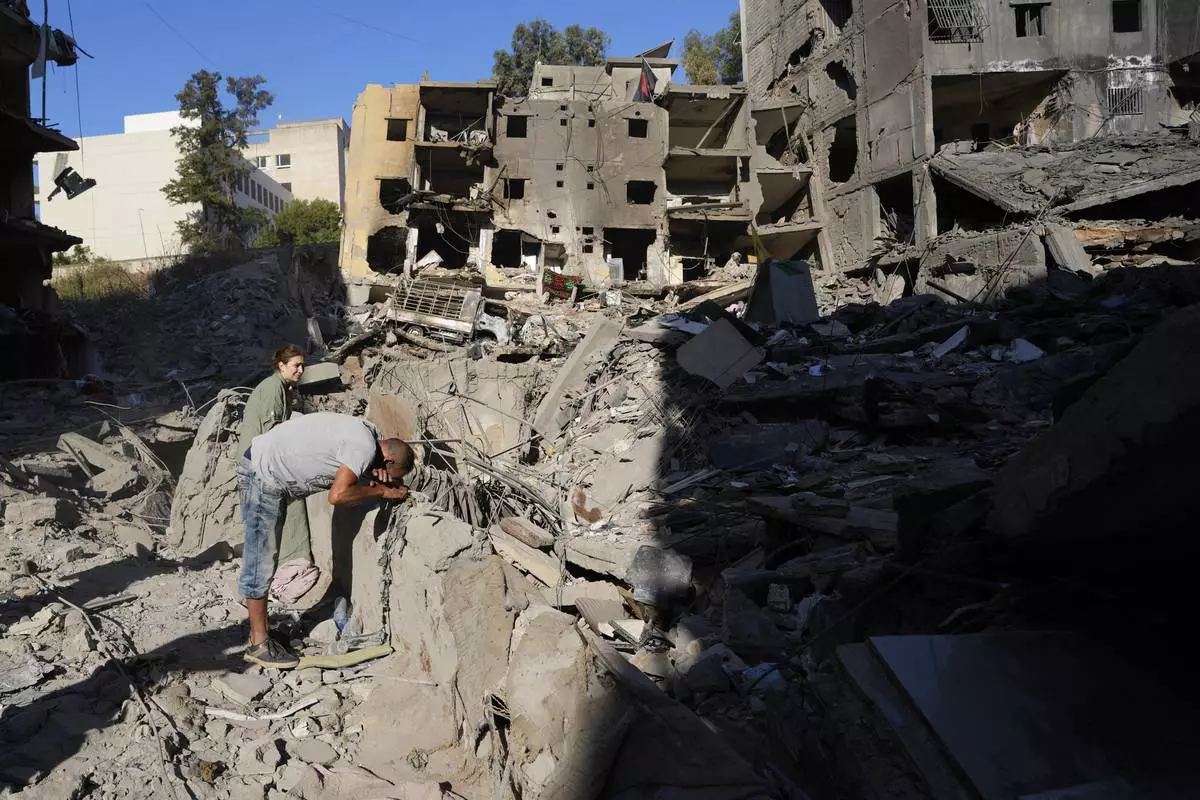
A man mourns at the site of the assassination of Hezbollah leader Hassan Nasrallah in Beirut's southern suburbs, Sunday, Sept. 29, 2024. (AP Photo/Hassan Ammar)
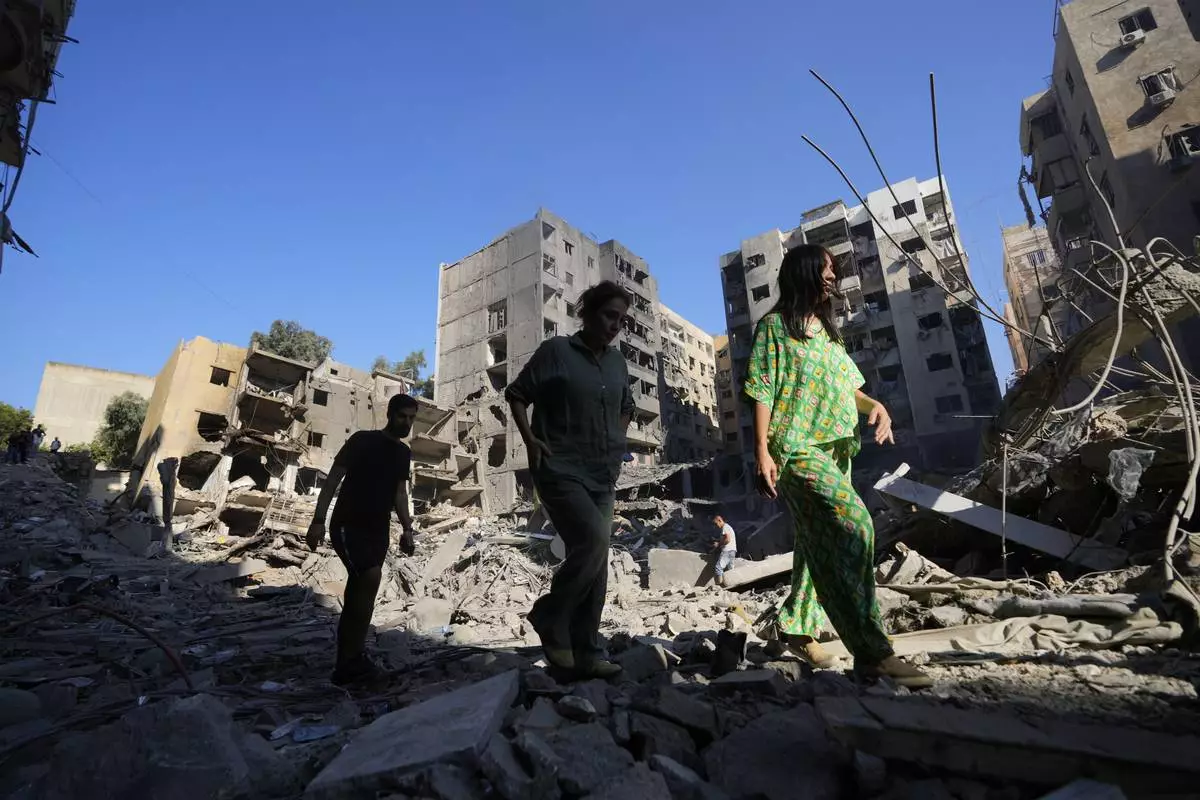
People check the site of the assassination of Hezbollah leader Hassan Nasrallah in Beirut's southern suburbs, Sunday, Sept. 29, 2024. (AP Photo/Hassan Ammar)
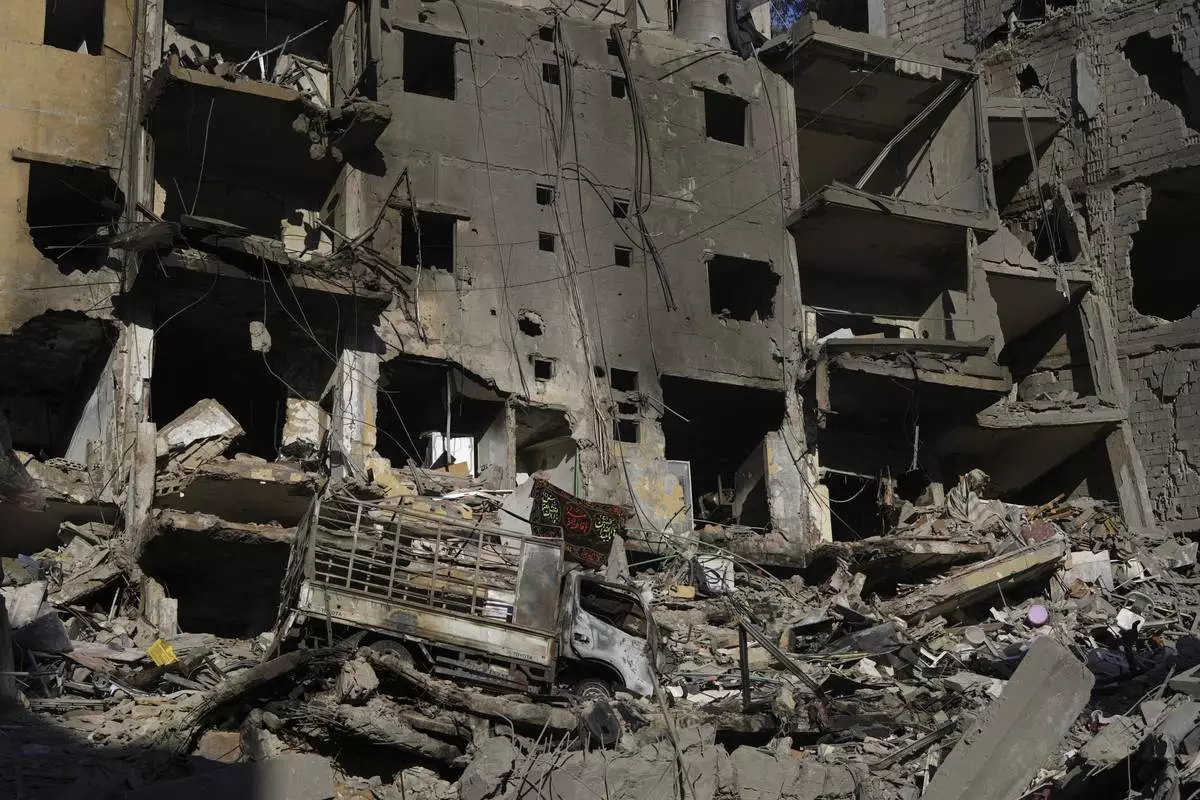
Crumbled buildings at the site of the assassination of Hezbollah leader Hassan Nasrallah in Beirut's southern suburbs, Sunday, Sept. 29, 2024. (AP Photo/Hassan Ammar)
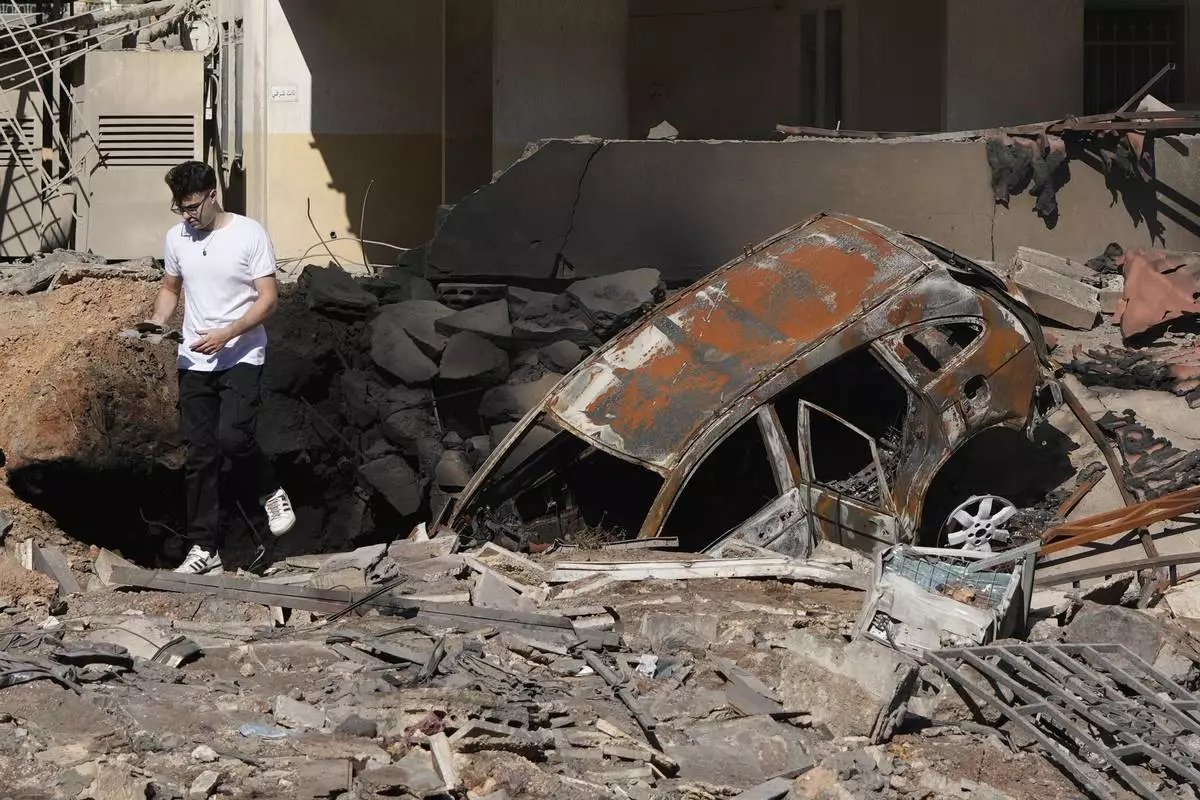
A man walks on rubble at the site of an Israeli airstrike in Beirut's southern suburbs, Sunday, Sept. 29, 2024. (AP Photo/Hassan Ammar)
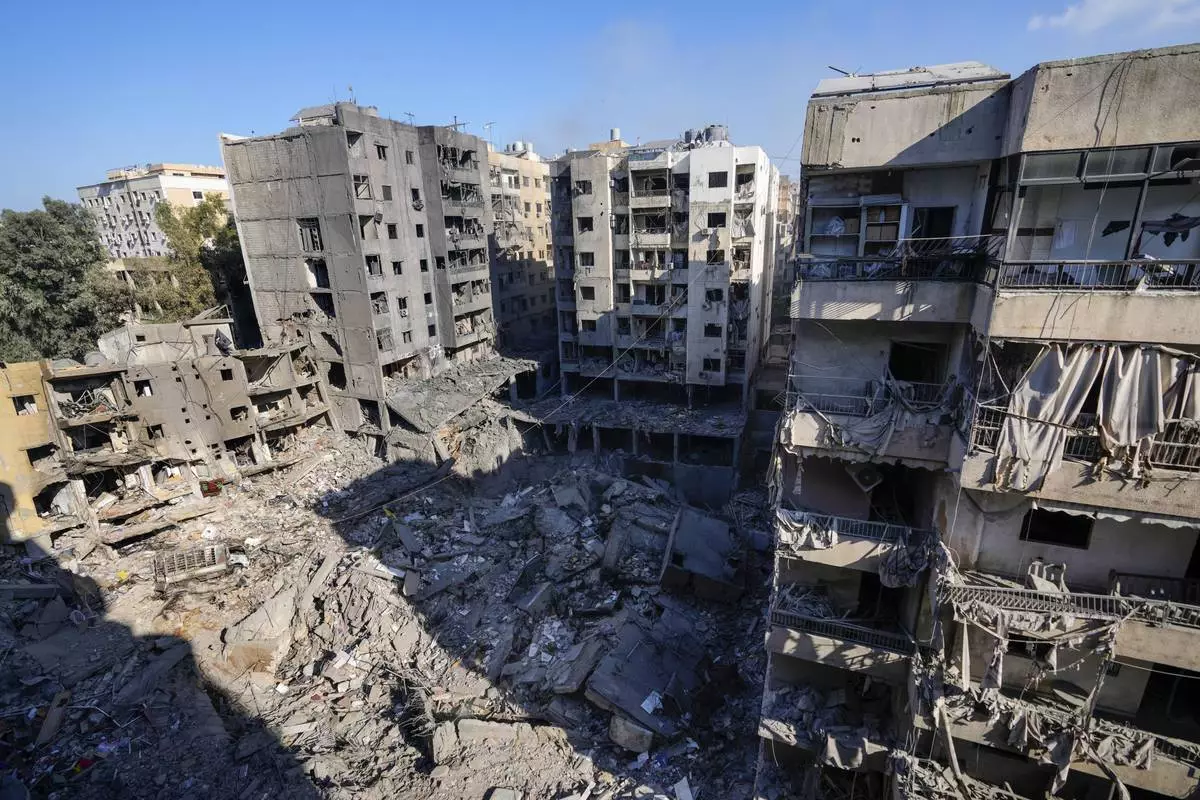
Damaged buildings at the site of the assassination of Hezbollah leader Hassan Nasrallah in Beirut's southern suburbs, Sunday, Sept. 29, 2024. (AP Photo/Hassan Ammar)
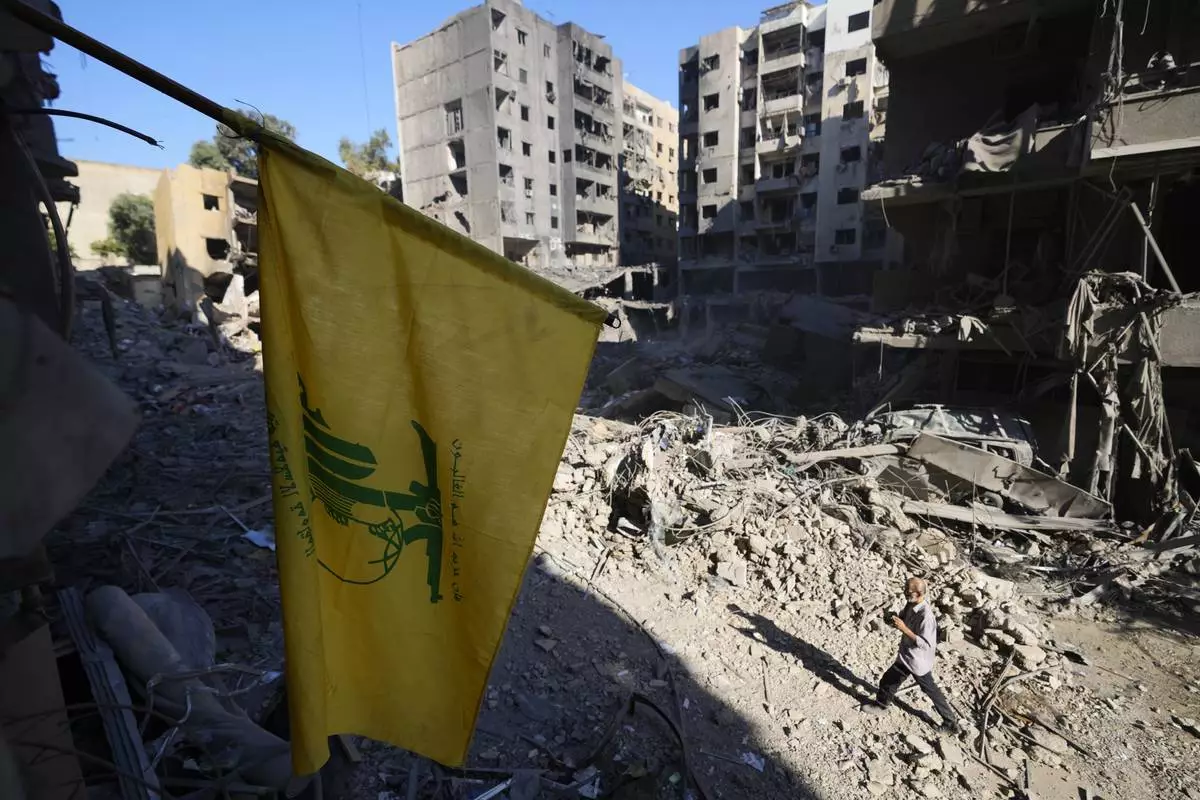
A Hezbollah flag at the site of the assassination of Hezbollah leader Hassan Nasrallah in Beirut's southern suburbs, Sunday, Sept. 29, 2024. (AP Photo/Hassan Ammar)
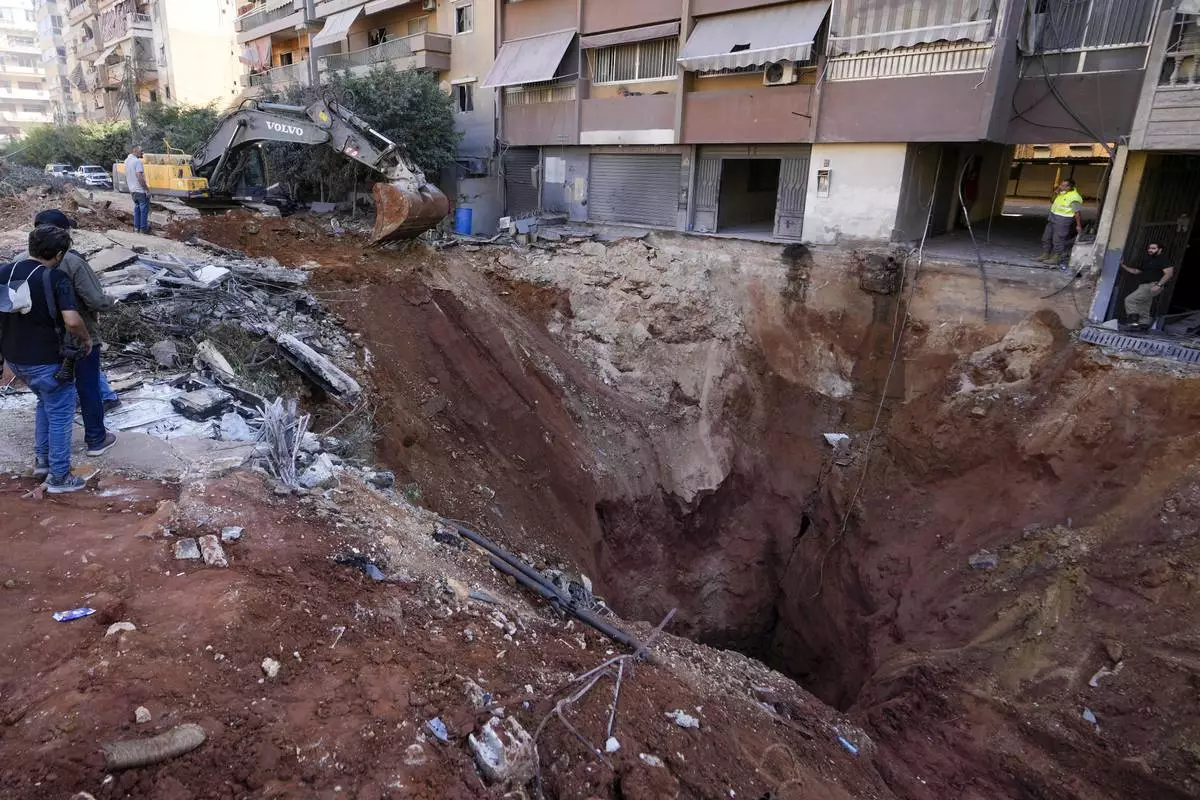
A hole in the ground near the site of the assassination of Hezbollah leader Hassan Nasrallah in Beirut's southern suburbs, Sunday, Sept. 29, 2024. (AP Photo/Hassan Ammar)
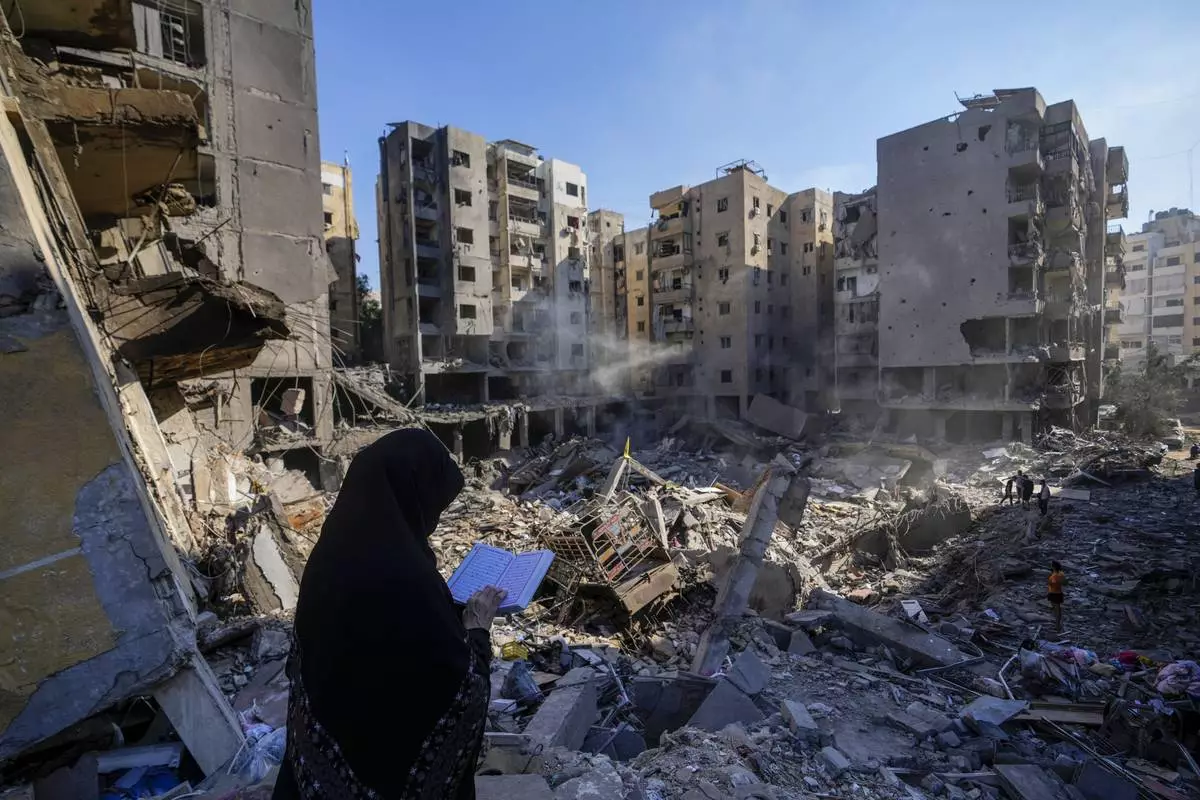
A woman reads the Quran at the site of the assassination of Hezbollah leader Hassan Nasrallah in Beirut's southern suburbs, Sunday, Sept. 29, 2024. (AP Photo/Hassan Ammar)
Hezbollah on Sunday confirmed the death of high-ranking official Nabil Kaouk in an Israeli airstrike, a day after the Lebanese militant group acknowledged the killings of multiple commanders, including longtime leader Hassan Nasrallah.
The statement came hours after an Israeli airstrike on northeast Lebanon killed 11 people. Israel says it's continuing to carry out attacks on Hezbollah targets in Lebanon.
Meanwhile, the number of people displaced by the conflict from southern Lebanon has more than doubled and now stands at more than 211,000, according to the United Nations.
Hezbollah and Israel have traded near-daily strikes since the Israel-Hamas war started after the Gaza-based Palestinian militant group stormed into Israel almost a year ago on Oct. 7, sparking fears of regional war.
Here is the latest:
DAMASCUS, Syria – The United Nations’ refugee agency says 70,000 people have crossed from Lebanon into Syria to escape Israeli bombardment.
The total includes both Lebanese citizens and Syrians who had moved to Lebanon but are now returning.
Sarah Haj Hassan fled Shmustar near Lebanon’s eastern city of Baalbek, on Saturday after intense Israeli strikes.
She’s one of some 7,500 people who has registered in the Sayyida Zeinab suburb of Damascus.
“I lost my house, and my parents’ house was damaged,” she told The Associated Press. “At the end of the day, we need to care for our children.”
ROME -- Italian Defense Minister Guido Crosetto says he hopes the presence of Italian soldiers in Lebanon as part of peacekeeping missions will encourage de-escalation.
Crosetto said Sunday that “the presence of our military is an element of guarantee that we hope can induce the parties to de-escalation, creating the conditions to reopen the dialogue and start mediation.”
Italy has troops in Lebanon as part of the United Nations mission known as UNIFIL and a bilateral mission, MIBIL.
Crosetto said Italy has arrangements in place to evacuate Italian civilians from Lebanon if the situation deteriorates.
WASHINGTON -- A senior White House official says Israel has “wiped out” Hezbollah’s command structure with a barrage of airstrikes, but warned that the militant group will work to quickly rebuild.
National security spokesman John Kirby said “they will try to recover. We’re watching to see what they do to try to fill this leadership vacuum.”
Referring to the strike that killed Hezbollah leader Hassan Nasrallah, Kirby said, “I think people are safer without him walking around.” But, speaking on CNN’s “State of the Union,” he sidestepped questions about whether the administration agreed with how the Israelis are going about targeting Hezbollah leaders. Lebanese officials say the strikes have killed many civilians.
The White House continues to call on Israel and Hezbollah to agree to a 21-day temporary cease-fire that was floated by the U.S., France and other countries last week, but rejected by Israeli Prime Minister Benjamin Netanyahu.
BEIRUT -- Hezbollah has confirmed the death of high-ranking official Nabil Kaouk in an Israeli airstrike, the seventh senior commander killed in just over a week.
The Israeli military had earlier said it killed Kaouk in a strike in a southern Beirut suburb on Saturday.
Kaouk was deputy head of Hezbollah’s Central Council. He also served as Hezbollah’s military commander in south Lebanon from 1995 until 2010.
He is the seventh senior leader of the Lebanese militant group to be killed since Sept. 20, including Hassan Nasrallah, who was Hezbollah’s top leader for more than three decades.
DEIR AL-BALAH, Gaza Strip — Palestinian officials say an Israeli airstrike has killed at least four people in a school sheltering the displaced in northern Gaza.
The Israeli military said it carried out a precise strike Sunday on Hamas militants who were using the Umm al-Fahm school in the northern town of Beit Lahiya as a command-and-control center, without providing evidence.
The Civil Defense, first responders who operate under the Hamas-run government, confirmed the toll and said several others were wounded. It did not say whether those killed and wounded were civilians or combatants.
Footage circulating online showed first responders racing into the damaged school. They could be seen treating a woman and a minor who had burns on his hand.
Israel has repeatedly struck schools-turned-shelters in Gaza, accusing militants of hiding out in them.
Some 90% of Gaza’s population of 2.3 million people have been displaced by the nearly yearlong war, with hundreds of thousands living in shuttered schools or squalid tent camps.
TEHRAN, Iran — Iran’s Vice-President Mohammad Javad Zarif says Supreme Leader Ayatollah Ali Khamenei will decide on a response to Israel’s strikes in Lebanon “at the appropriate time.”
The semi-official ISNA news agency quoted Zarif as saying that “Iran’s reaction will be done at the appropriate time and according to Iran’s choice against the crimes of the Zionist regime, and decisions will be made at the leadership and high level of the government in this regard.”
Zarif made the comments when he attended Hezbollah’s office in Tehran to express condolences over the killing of its leader, Hassan Nasrallah, in an Israeli airstrike in Beirut on Friday.
BEIRUT – The U.S. military says it killed 37 militants linked to al-Qaida and the Islamic State group in two strikes in Syria this month.
U.S. Central Command said it struck northwestern Syria on Tuesday targeting a senior militant in charge of military operations for the al-Qaida-linked Hurras al-Deen group and eight others.
It also said a large-scale airstrike on Sept. 16 targeted an IS training camp in a remote location in central Syria. That attack killed 28 militants including “at least four Syrian leaders,” the U.S. said.
There are some 900 U.S. forces in Syria, along with an undisclosed number of contractors, mostly trying to prevent any comeback by the extremist IS group, which swept through Iraq and Syria in 2014, taking control of large swaths of territory.
BEIRUT — Hezbollah has confirmed the death of a senior commander in charge of its southern front.
The Lebanese militant group says Ali Karaki was killed in an intense Israeli airstrike on Friday that also killed the group’s leader, Hassan Nasrallah, in Beirut.
It says Karaki was responsible for all of Hezbollah’s units in southern Lebanon in the ongoing conflict with Israel.
He is among a handful of senior officials in the militant group killed in Israeli strikes in Lebanon in recent days.
The Israeli military said Sunday that it killed another high-ranking Hezbollah official, Nabil Kaouk, in an airstrike on Saturday.
BEIRUT — The World Food Program says it has launched an emergency operation to provide food to up to 1 million people displaced by violence in Lebanon.
The U.N. agency said Sunday it distributes ready-to-eat food rations, bread, hot meals and food parcels to families in shelters across the country.
The agency says it needs $105 million to help it continue the work until the end of the year and has urged the international community to support the humanitarian response.
Corinne Fleischer, the agency’s regional director for the Middle East, North Africa, and Eastern Europe, said: “Lebanon is at a breaking point and cannot endure another war.”
Lebanese Environment Minister Nasser Yassin said the government estimates that about 250,000 people are in shelters while four times as many may be displaced outside the shelters.
TEHRAN, Iran — Iran’s foreign minister, Abbas Araghchi, said the “horrific” killing of General Abbas Nilforushan wouldn’t “go unanswered,” the foreign ministry’s website reported Sunday.
Nilforushan, a senior officer in Iran’s Revolutionary Guard, was killed in the same Israeli strike on Beirut Friday that targeted Hezbollah leader Hassan Nasrallah.
Araghchi called the killing a “horrible and cowardly act” and vowed to use all political, diplomatic, legal, and international channels to pursue those behind it and their supporters.
JERUSALEM — The Israeli military says it has uncovered and dismantled a Hamas tunnel in central Gaza that was over a kilometer (0.6 miles) long.
It said Sunday that the tunnel ran near residential buildings, and that inside were several rooms and equipment used by militants for prolonged stays.
The military released footage showing the entrance to the tunnel, a long staircase leading down and what appeared to be an iron blast door.
Hamas is believed to have built hundreds of kilometers (miles) of tunnels across Gaza to evade Israeli airstrikes. The militants have also used the tunnels to hold hostages captured in the Oct. 7 attack that triggered the war and to launch ambushes against Israeli forces.
CAIRO – Egypt’s president says its revenues from the Suez Canal have dropped by 60%, or more than $6 billion, in recent months as attacks by Yemen’s Houthi rebels disrupt Red Sea shipping.
The canal is a major source of foreign currency for Egypt’s battered economy.
President Abdel Fattah el-Sissi spoke during a graduation ceremony Sunday at the Police Academy in Cairo.
“The ongoing developments are very serious and could lead to expanding the conflict’s theater,” he said.
Attacks by the Iran-backed Houthis have led shipping firms to divert traffic around the Red Sea and, by extension, the Suez Canal linking it to the Mediterranean.
The Israeli military said it killed Nabil Kaouk, a high-ranking Hezbollah official, in a strike in a southern Beirut suburb on Saturday.
Sunday's announcement came a day after Hezbollah confirmed the killing of leader Hassan Nasrallah. There was no immediate comment from the Lebanese militant group.
Kaouk is the deputy head of Hezbollah’s Central Council. He also served as Hezbollah’s military commander in south Lebanon from 1995 until 2010.
In 2020, the U.S. Treasury sanctioned Kaouk and another member of Hezbollah’s council, Hassan al-Baghdadi.
DEIR AL-BALAH, Gaza Strip — Palestinian officials say Israeli strikes have killed at least four people in the Gaza Strip.
Two people were killed in separate strikes early Sunday in the built-up Nuseirat refugee camp in central Gaza. That’s according to the nearby Awda Hospital, which received the bodies. It said another six people were wounded.
In northern Gaza, first responders recovered two bodies after a strike on a house early Sunday, according to the Civil Defense, which operates under the Hamas-run government.
The Gaza Health Ministry says over 41,000 Palestinians have been killed in the Israel-Hamas war, more than half of them women and children. It does not say how many of those killed were militants. Israel says it has killed over 17,000 fighters, without providing evidence.
The war began when Hamas-led militants stormed into southern Israel on Oct. 7, killing some 1,200 people, mostly civilians, and taking around 250 hostage. Around 100 captives are still being held in Gaza, a third of whom are believed to be dead.
DAMASCUS, Syria — A number of militants were killed and wounded in eastern Syria early Sunday near a strategic border crossing with Iraq in apparent airstrikes, pro-government media and an opposition war monitor reported.
Pan-Arab television network Al-Mayadeen cited unnamed sources saying that at least eight Syrians were killed in the strike by the Bou Kamal crossing in Israeli airstrikes.
It was unclear how they confirmed Israeli jets were behind the strikes.
Meanwhile, Britain-based opposition war monitor the Syrian Observatory for Human Rights said five airstrikes killed at least 15 militants, among them leaders, and wounded at least 20 others. The Observatory said the strikes targeted headquarters and warehouses in the city of Deir al-Zour and surrounding towns.
None of the reports could be independently verified.
BEIRUT — Hundreds of thousands of people in Lebanon have been displaced from the ongoing conflict between Hezbollah and Israel, a Lebanese cabinet minister spearheading the country’s emergency response said.
Environment Minister Nasser Yassin said the government estimates that about 250,000 people have left their homes and taken refuge in government-run shelters and informal ones. However, he told the Associated Press the total number is about “four times as many directly affected and/or displaced outside the shelters.”
The United Nations said that as of Friday, 211,319 people were forced to relocate, and that was before some intensive Israeli airstrikes over Beirut’s southern suburbs in recent days.
The Lebanese government has converted schools and other facilities into temporary shelters. Still, many are sleeping on the streets or in public squares, as the government and non-governmental organizations try to find them places to stay.
TEHRAN, Iran — Thousands of people have gathered across Iran to protest the killing of Hezbollah leader Hassan Nasrallah in an Israeli airstrike.
State TV aired footage of protests in several major cities on Sunday. At Iran’s parliament, lawmakers chanted “Death to America” and “Death to Israel.”
Iran helped establish Hezbollah in the 1980s and has provided the Lebanese militant group with sophisticated weaponry and training.
The airstrike that killed Nasrallah on Friday also killed Gen. Abbas Nilforushan, a senior officer in Iran’s Revolutionary Guard. The Guard officially confirmed Nilforushan’s death on its website Sunday, after it had been widely reported in state media the day before.
BEIRUT — In its first statement since the recent escalation with Israel and following the killing of Hezbollah leader Hassan Nasrallah, Lebanon's military called for calm “at this dangerous and delicate stage."
Government officials fear that the country’s deep political divisions at a time of war could rekindle sectarian strife and violence in the small Mediterranean country.
“The Israeli enemy is working to implement its destructive plans and spread division among the Lebanese,” the military said.
Military vehicles have been deployed in different parts of the capital as thousands of displaced people continue moving from the south to Beirut.
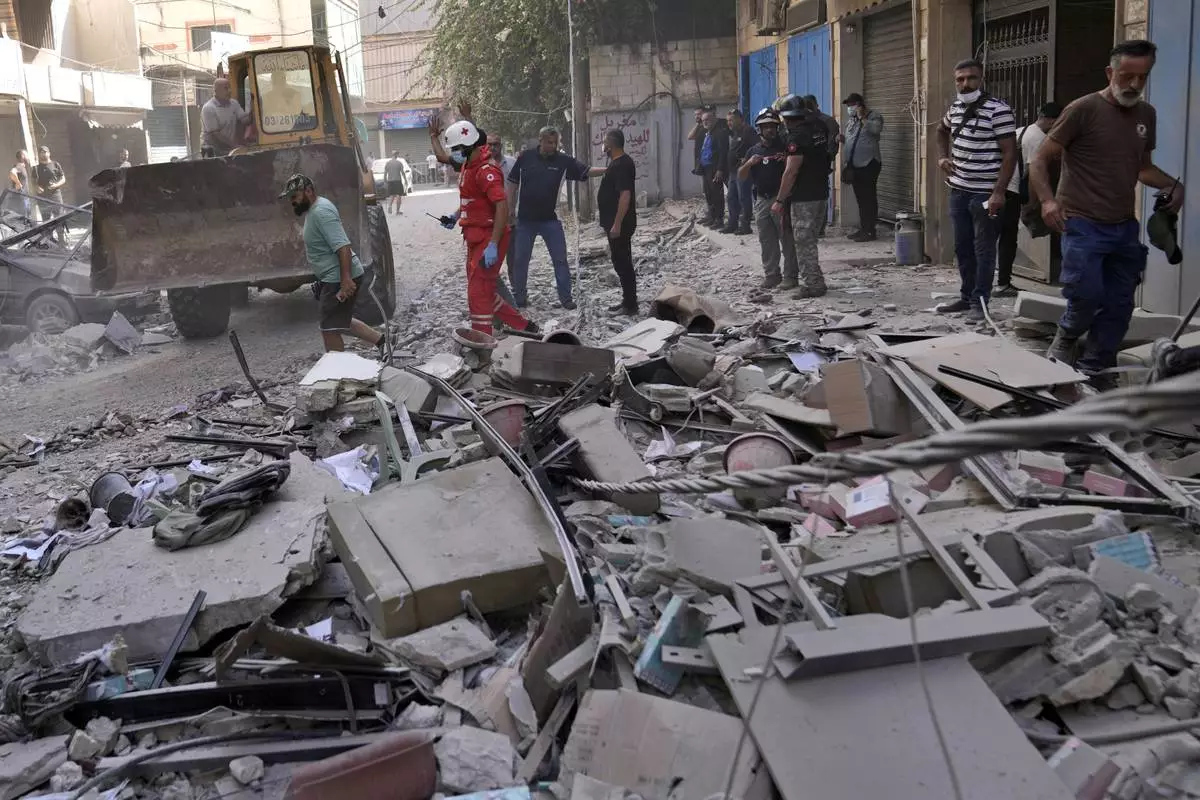
Rescuers arrive at the scene of an Israeli airstrike in Beirut's suburb of Ghobeiri, Sunday, Sept. 29, 2024. (AP Photo/Hussein Malla)
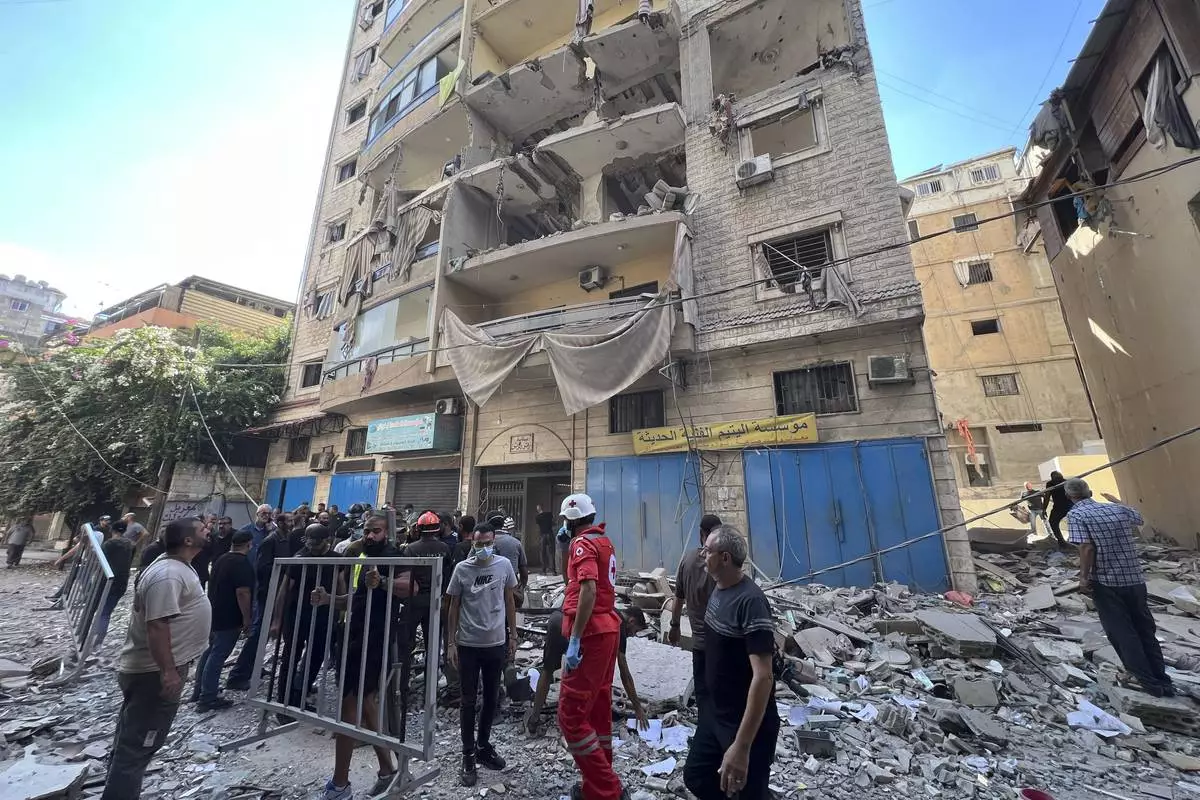
Rescuers arrive at the scene of an Israeli airstrike in Beirut's suburb of Ghobeiri, Sunday, Sept. 29, 2024. (AP Photo/Hussein Malla)
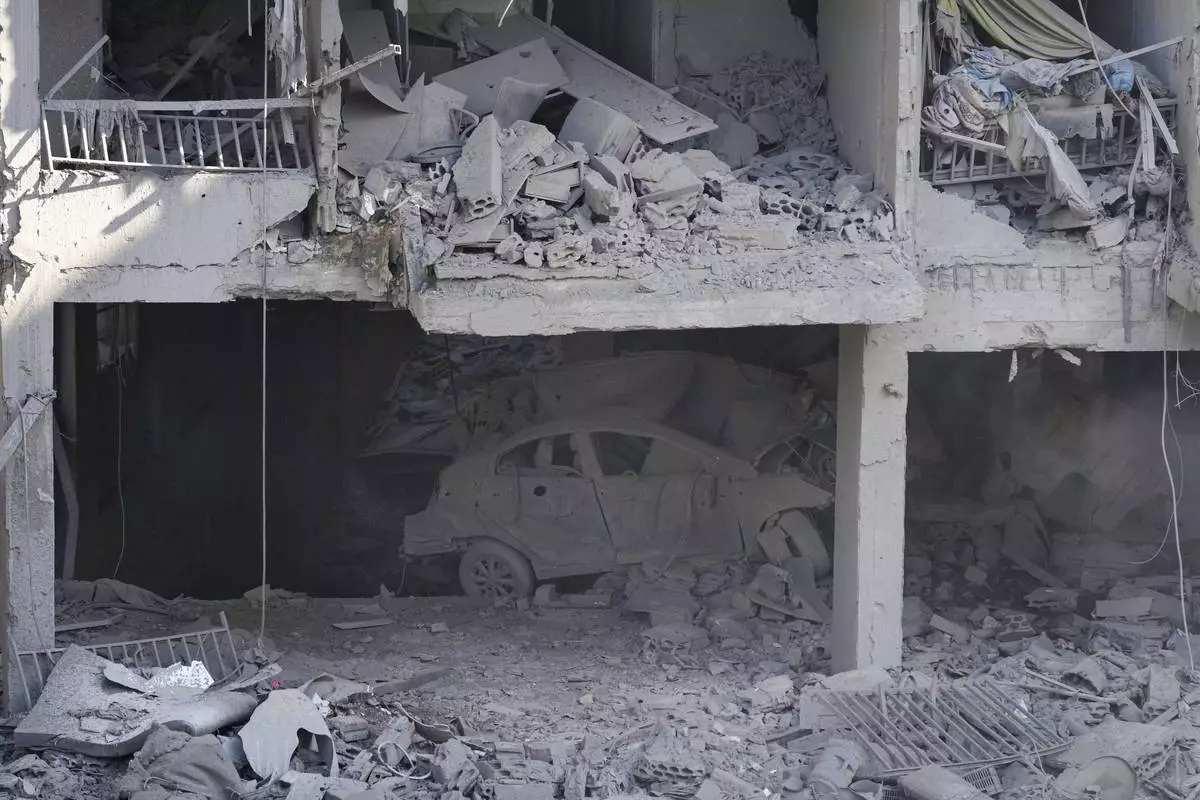
A destroyed building at the site of an Israeli airstrike in Beirut's southern suburbs, Sunday, Sept. 29, 2024. (AP Photo/Hassan Ammar)
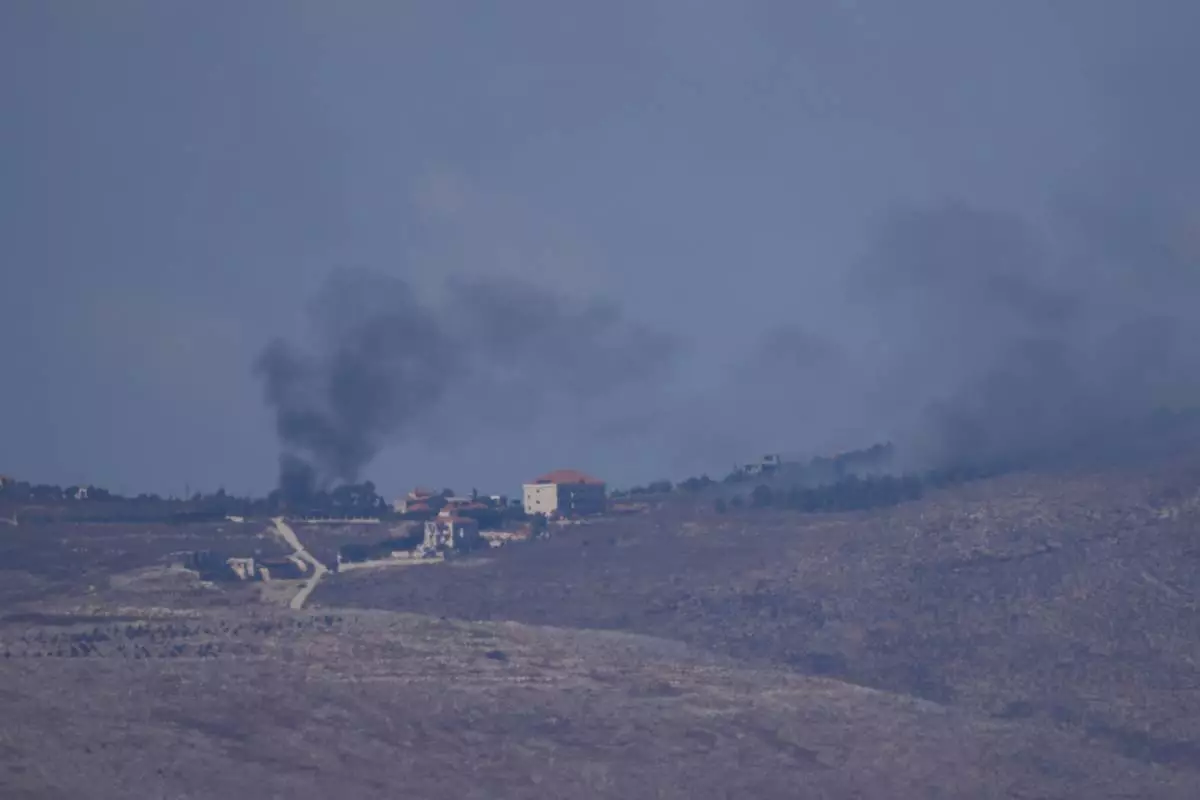
Smoke rises following an Israeli airstrike in southern Lebanon as seen from northern Israel on Sunday, Sept. 29, 2024. (AP Photo/Ariel Schalit)
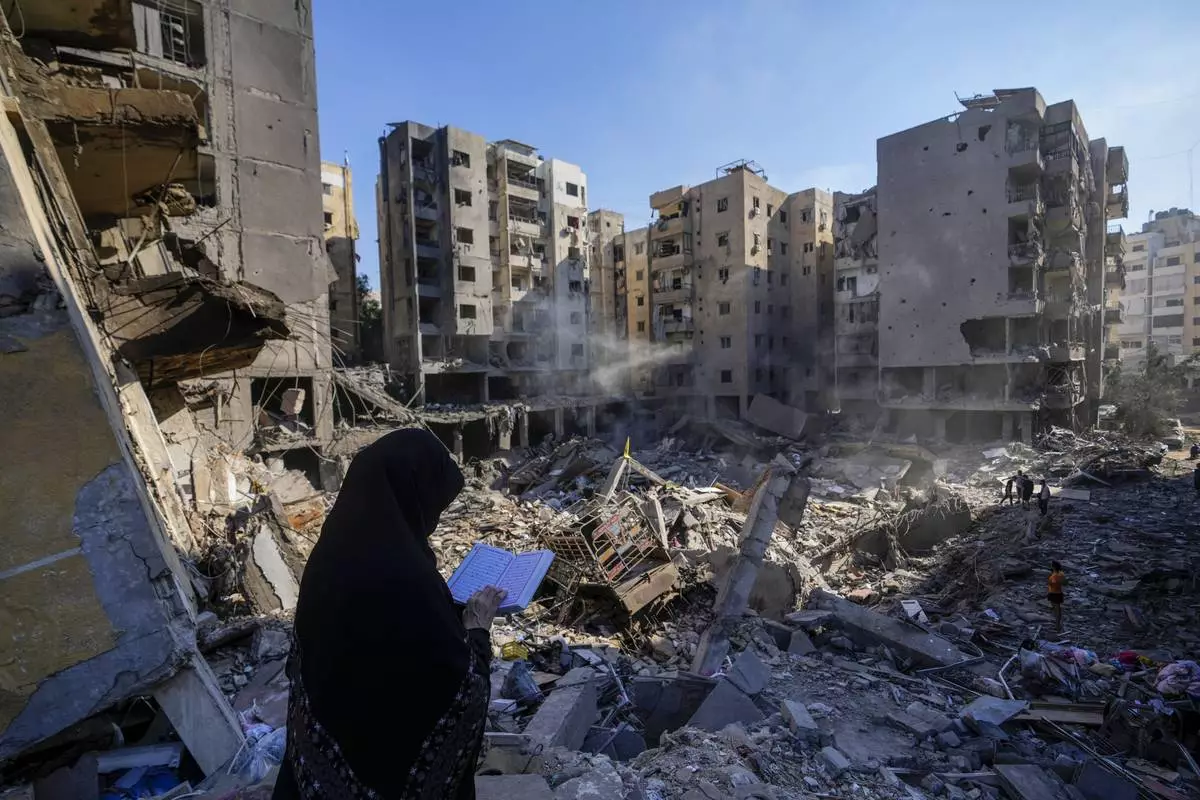
A woman reads the Quran at the site of the assassination of Hezbollah leader Hassan Nasrallah in Beirut's southern suburbs, Sunday, Sept. 29, 2024. (AP Photo/Hassan Ammar)
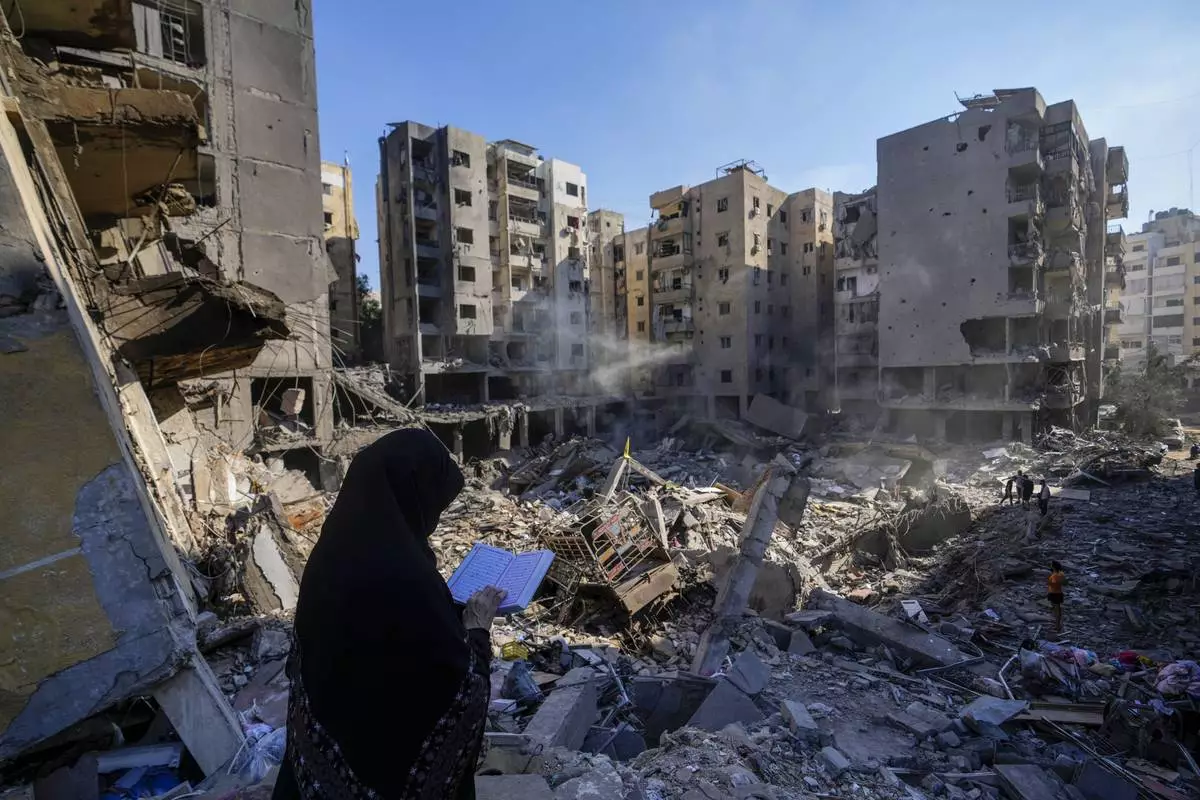
A woman reads the Quran at the site of the assassination of Hezbollah leader Hassan Nasrallah in Beirut's southern suburbs, Sunday, Sept. 29, 2024. (AP Photo/Hassan Ammar)












